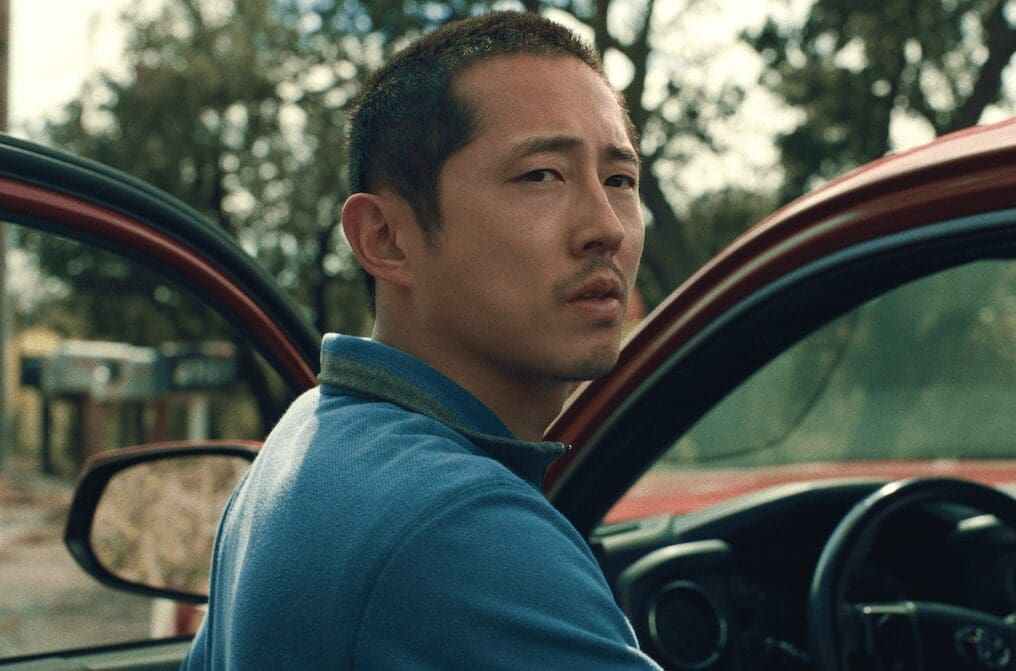
Netflix and A24 pair up alongside showrunner/writer Lee Sung Jin to weave together a thrilling modern tale of revenge that features some incredibly cathartic character arcs and captivating performances.
Beef starts as a simple instance of road rage between struggling handyman Danny (Steven Yeun, Minari) and hopeful entrepreneur Amy (Ali Wong, Always Be My Maybe) that evolves into something much darker and more complex. The revenge game that ensues has a darkly hilarious and haunting mix of pettiness and personal attacks that quickly become enthralling to watch play out. There’s always this lingering tension between these two even when they’re nowhere near each other, and the ripples of their acts of revenge against each other can be surprisingly devastating. As their obsession with revenge grows, it’s wild to see how ingrained they become in each other’s lives and how deep their anger runs.
If Beef was just a simple revenge story, it would be a binge-worthy experience sheerly from the thrills and chaos it provides. But, right from its first episode, Beef shows itself to be so much more than just revenge thrills and quickly expands into a deeply character-driven story about depression and self-realization. Both Yeun and Wong excellently display their character’s flaws and frustrations that stem from things outside of their conflict with one another. For Danny, the way he constantly drags himself down and is plagued by this self-degrading “there’s always something” mentality has led him down a toxic path that threatens his stability. For Amy, she struggles to find a way to feel self-fulfilled in her work and personal life, leading her to feel alone and unable to really talk about her feelings.
Although they don’t see it at first, Danny and Amy aren’t all that different and both of their stories reflect this gutting reality of being unable to express true feelings and seek help. The way that Beef depicts Danny and Amy struggling to find someone to confide in and commonality that doesn’t make them feel alone is so tragically real, and the way it influences their growing depression adds to the series’ themes. There are cultural and familial influences that play major roles in their loneliness and this ideology of keeping feelings held in that heavily impacts them and makes for a relatable story on mental health. Yet there are also some self-inflicted wounds that expand on the impact of their depression and how it influences them.
Beef is really a great showing of how corrosive depression can be for someone. There are times where Danny and Amy feel as if they can never be happy, and it generally leads them to make toxic choices. There are moments of self-sabotage that feel directly linked to their anger and sadness for themselves, and it symbolizes how crushing these feelings have become for both of them. There’s a turning point where Danny and Amy’s choices become less calculated and cunning and more of a sad reflection of their desperation to simply feel anything. The series really hits some high emotional points in its later half and finds ways to really make its messaging on grief and a lack of support hit like a truck.
A big reason that this more emotionally gripping turn in the series works though is because Yeun and Wong are putting in career-best performances. While Yeun’s performance will easily be the most talked about part of Beef because of the raw energy he brings to Danny’s turmoil and the relatability of Danny’s experience, Wong delivers an equally captivating and deep performance. They both emphasize the growing anger their characters have towards each other and the slow realization and resistance of their own flaws. Yeun and Wong really bring their all to Beef and it’s a key reason why their respective characters and their stories and perspectives are so engaging and impactful. They’re undoubtedly top awards contenders, and frankly, it’s fair to say that Young Mazino and Joseph Lee should be top names in supporting categories for their incredible performances Danny’s brother Paul and Amy’s husband George, respectively.
All the performances and themes of Beef are excellently elevated by the phenomenal storytelling and writing on display that continually finds ways to shock viewers and subvert their expectations. The entire last half of Beef is chock full of unexpected turns and shocking reveals that literally leave your jaw hanging because of the ripples caused and the impact they have. There are times where the series subtly hints at certain details and actions with the characters but doesn’t fully disclose the meaning of them. Then, the meaning suddenly hits, and you’re left with new revelations and perspectives on Danny and Amy that really make you further invested in their stories. Beef really has this great narrative that intertwines anger and rage with cathartic sequences of Danny and Amy finding themselves to make for a heavily compelling and thoroughly moving watch. By the end, you’re left stunned by the fallout of everything, yet fulfilled in seeing Danny and Amy really come to grips with themselves and each other.
Beef has every aspect and strength to become every Netflix subscriber’s next binge obsession. It features award-worthy performances and striking characters that have you completely under their spell from start to finish. It also has incredibly timely and important story threads surrounding lingering anger and depression. Beef is that type of viewing experience that sticks with you, and with it displaying some effective ideas on the importance of self-expression, it’s truly food for the soul.

